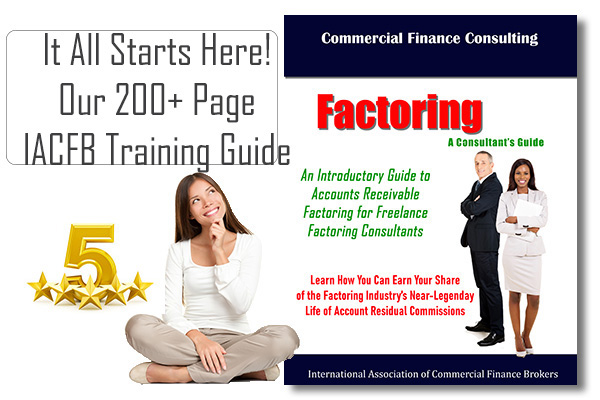Know Your Stuff Contest
Part Seven: How Do Brokers and Consultants Develop Their Business?


How Do Brokers and Consultants Develop Their Business
For today’s entrepreneurs willing to invest the time and effort in developing a home-based career in consulting, there are few professions that can compare with that of factoring broker or as it is better termed, commercial finance consultant. To succeed in this unique industry, however, will take time and patience. Success for freelance brokers is, of course, all about business development and few that enter the industry really come equipped initially with the many skills necessary to become a six-figure industry success. The marketing and prospecting skills you need must be learned.
Business Development
Though the topic of business development is too expansive to cover in depth in those short course, it’s a good idea to begin thinking now about how you will generate your leads and run the marketing aspects of your new factoring broker business.
Understand, once you have discovered it, this is a very easy business to enter. You only need…
- Some product training
- A computer of recent vintage
- A modern WordPress website with internet access
- A dependable vehicle to attend networking events
Business Development is an all encompassing term that defines the tools and strategies you will employ to generate new clients. As opposed to a simple “sales person”, “business developers” take an analytical approach to the tasks of advancing targets through the sales pipeline to become revenue-generating clients. Additionally, one of business development’s primary characteristics is the use of strategic partnerships or artfully and purposely building relationships with others that can act as “referrers” and send significant business their way.
Your Sales Pipeline: Is It a Sales Pipeline or Educational Pipeline?
As a freelance broker or consultant in factoring and alternative commercial finance products, developing and managing your “sales pipeline” is a relatively easy task. You are never a salesman. And, this is simply because factoring, just as any loan product, cannot really be “sold”. A business owner either needs capital or cash flow solutions to build the business or it doesn’t. Your job is:
- First…To EDUCATE: As a consultant, your job is educating business owners and creating an awareness of factoring and its problem solving capabilities rather than actually selling it. It is needed by a business owner, or it is not.
- Second…To RECOGNIZE: You need to being able to recognize quality “target types” or groups of business owners, carefully manage the educational process directed to these entrepreneurs, and subsequently build relationships with them. In many cases, business owners will, at some time, need capital. If the banks aren’t lending and they require business financing, you need to make sure they come to you, their personal business finance consultant.
- Third…is to MANAGEMENT: You need to effectively manage the “educational process” regarding prospective business owners so that it is both time and cost effective for both you and your prospects.
Industry Success: It’s All About Fishing and Keeping Your Line in the Water
Have you ever been fishing when you could drop a bait right in front of a fish, only to have it turn up it’s nose and swim away? Then, later in the day, when the timing is just right, the same fish will savagely bite on a completely empty hook? Well, trying to “sell” factoring to a business without the cash need is exactly the same thing. They will walk away. Yet, at some time down the road, when the cash need arises, that same business owner will not be able to sign the factoring contracts and agreements fast enough. And you will get that business (and lots others) if you simply keep your line in the water.
So business development in the factoring industry is really all about education and keeping your line in the water. It’s about perseverance. Virtually every business will, at one time or another, struggle with cash flow or working capital problems. When they do, it needs to be your bait they see when that need arises. When times are tough and banks stop lending, as they are right now, that is when we add some additional bait. In short…that is when we turn up our “prospecting”.
Long Cycle Sales / Goals / Drip Marketing
Almost all fields of consulting operate in an atmosphere of “long cycle sales” and the business of commercial finance consulting is no different. As we’ve said before, you cannot sell factoring or other forms of alternative commercial finance. A business either has a cash flow problem or it does not. If they do have a cash problem, it can either access bank lines of credit or it cannot. Those companies that are experiencing cash flow problems that cannot be solved through accessible bank loans are the targets of factoring brokers and commercial finance consultants.
Additionally, your freelance brokering business is a numbers game. Have you seen the fisherman with six different poles sticking out of his boat? Of course. He knows his chance of catching a keeper is much greater if he has six lines in the water rather than just one. The same is true in your job as a consultant in this business.
If you compile a list of 25-50 targets and market to them, you may get a sale or maybe not. If you compile a list of 250-500 targets and market them, you are much more likely to get a sale or maybe two. If you compile a list of 2500-5000 targets and market to them, you are probably well on your way to success in the industry. A “seasoned” freelance broker or consultant with years of experience, may have 10,000 or more targets in his or her prospect list. And, at that point, business simply begins to come your way.
The challenge is in managing those numbers effectively and managing the associated costs involved in marketing to them. The numbers management is easy. You will use a CRM or Customer Relationship Manager and at IACFB, we highly recommend Pipedrive CRM due to its low cost and ease of operation.
Your Business Development Marketing Mix
As a factoring broker, you have dozens of tools in your marketing arsenal and which tools you choose to employ will depend on both your goals and financial ability. New career-oriented brokers trying to exit an unfulfilling job and quickly become successful freelancer, will likely employ a number of direct marketing tools where they focus on getting immediate responses (and immediate income).
Others, not in such a hurry and more long-term goal oriented, will focus more heavily on networking and relationship building, seeking to earn referrals over time. As we’ve mentioned before, industry polls show year after year, that roughly 50% of new accounts are generated by direct marketing and 50% by networking and relationship building. How you mix and balance the two business development methods to meet your particular financial goals is up to you.
